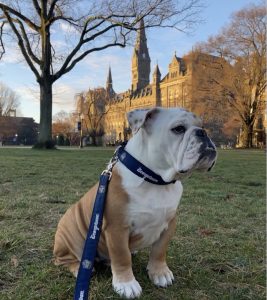A Georgetown University Law Center graduate wrote a letter to Georgetown President John J. DeGioia (CAS ’79, GRD ’95) advocating for the discontinuation of Jack the Bulldog, the university’s live animal mascot, citing health issues and concerns specific to his breed.
Sheila Choi (LAW ’21), founder and CEO of The Fuzzy Pet Foundation (TFPF), wrote the letter to address her concerns about animal exploitation, claiming the overwhelming and noisy environment of school events could induce stress for Jack’s high-maintenance breed. Choi’s interest was sparked by the unexpected death of the former Jack last year.
Citing breed-specific information about Jack, Choi said factors like loud noises and hot temperatures could overwhelm him.
“The concern is that Georgetown is using a brachycephalic breed, that Jack is, to use as a mascot to cart around at sporting events, where there are large and loud crowds in a room that is not necessarily temperature controlled,” Choi told The Hoya. “We could totally depend on a live human mascot instead of exploiting a live, sentient being.”
In her letter, Choi argued that Jack’s breed is genetically prone to numerous health issues, including breathing difficulties, heat stroke and skin infection. She raised moral and health concerns about the use of a metal choke collar, noting that it obstructs dogs’ breathing and poses a risk of damage to the trachea, which serves as an airway passage.

“The animal rights community globally agrees that chain collars should never be used, as they can cause undue harm and discomfort,” Choi wrote in the letter. “Such practice, widely considered inhumane, does not align with our Jesuit values of compassion and care for all God’s creatures.”
People for the Ethical Treatment of Animals (PETA) stressed the broader issue of using live animals for college mascots, arguing that subjecting animals to close contact with large crowds of people is speciesist, stressful and inhumane. PETA wrote directly to Georgetown University following the announcement of the new Jack after the previous Jack passed away in 2023, stating that breathing-impaired breeds (BIBs) struggle to perform basic tasks due to breathing difficulties.
“Many BIBs can’t even enjoy a proper walk or chase a ball — things that make dogs’ lives joyful and fulfilling — without gasping for air.” PETA wrote in the letter. “We ask that you resist the urge to maintain the status quo and instead make good on Georgetown’s commitment to the ‘common good’ by moving away from this cruel tradition of using deformed dogs, thereby inadvertently driving up the demand for them.”
In addressing these assertions, a university spokesperson spoke to the importance of the tradition surrounding Jack the Bulldog and offered assurance regarding Jack’s well-being.
“Georgetown always takes special care to prioritize the health of Jack the Bulldog,” the spokesperson wrote to The Hoya. “The university has long been committed to placing the health of each Jack before his official duties, and has strict requirements to ensure Jack’s safety and wellbeing.”
Victoria Han (MSB ’26), an owner of three dogs at home, said that the noise of sports games reaches her dorm, Village C West (VCW), and voiced concerns about Jack’s well-being if he were to attend such events.
“Sometimes when I am sleeping on my bed in the morning, I can hear the music from the field. Imagine how Jack the Bulldog, who has better hearing, feels when he is exposed to the loud noises,” Han told The Hoya.
Valerie Ng (CAS ’26) said Jack’s presence contributes to a sense of unity and happiness on campus, noting that while stressful environments are unhealthy for Jack, the Jack Crew’s training prioritizes Jack’s well-being in these situations.
“I think that the dog itself brings a lot more joy to the campus,” Ng told The Hoya. “Everyone likes dogs, and Jack creates a sense of unity among students because he brings happiness to students when they see him on campus.”
“I believe Jack Crew only recruits people with experience with dogs, so I feel that he is being well taken care of. If he were stressed, they could probably tell from body language,” Ng added.
The spokesperson also stated that the Jack Crew is adeptly trained in Jack’s care, and has historically been successful.
“Jack is cared for by his caretaker and the Jack Crew, a group of students who have received training on ensuring Jack’s health, safety and wellness as they take him on daily walks and escort him to on- and off-campus events,” the spokesperson wrote. “The Jack Crew has helped look after the mascot for the past 20 years.”
Choi said she supports the complete end of using live mascots, arguing that despite training and requirements, the negative effects outweigh the positive, and Jack is better off in a safe and comforting environment.
“I wanted to be a voice for Jack and hopefully the school will listen and put an end to this,” Choi said. “This practice of using live mascots for the school is very outdated. I feel that Jack would really benefit from a stable, loving home as an indoor pet and not required to go out to these stressful events.”








